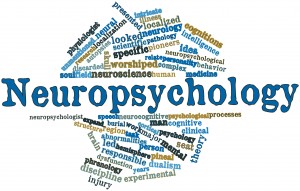How to Become a Neuropsychologist: Your Complete Guide to Degrees & Careers in Neuropsychology
 Neuropsychology careers involve the study of how the physical function of the brain and nervous system impact thoughts and behaviors.
Neuropsychology careers involve the study of how the physical function of the brain and nervous system impact thoughts and behaviors.
To put it in computer science parlance that anybody can understand, neuropsychology blends together the distinct field of neurology (which is essentially like studying the human processing hardware), and psychology (which is solely devoted to the software running in the mind).
That makes it an exciting field full of potential and leading to interesting new research subjects and treatment methods.
It also makes it one of the most dense and complex specializations in psychology. You better have your own software running at peak capacity if you are considering adopting neuropsych as your specialty.
It’s a seriously challenging career path, but it comes with big rewards.
What Does a Neuropsychologist Do?
It may seem obvious that the senses and thoughts that we experience are shaped in some way by the neural pathways and stimuli that run through our nervous system and into the brain. That much was old news to the Incas and the Sumerians, who not only noted that head injuries could affect thought and behavior, but came up with some rudimentary surgical techniques to deal with such problems. Descartes took the whole idea into the realm of philosophy, with “I think, therefore I am.”
But it took modern science to put the two together.
Neuropsychology is the field that ties together the thoughts and perceived experiences of the human mind with the brain structures and electrical impulses that generate them.
Neuropsychologists are the people behind that synthesis. They study both the anatomical and electrical features of the brain and nervous system, and the thoughts and behaviors that appear to be linked to those features. They often work in hospital settings, assisting patients with traumatic brain injury or central nervous system diseases work through the accompanying mental issues. They are also well-represented in research, tracing the connections and figuring out what parts of the brain are critical to what parts of higher thought.
They may spend much of their day assessing patients for mental deficits or treating the psychological bases of mental health issues. Other neuropsychologists engage in frequent experimentation, designing studies to look into how mind and body interact.
How To Become a Neuropsychologist in 5 Steps
If that all sounds insanely complicated to you, you’re right! Neuropsychology is a tough specialization to get into, and even tougher to master. Clinical neuropsychology is recognized as one of the American Psychological Association’s (APA) specialty fields. That means that the required expertise for the area is beyond what the average psychologist is expected to have.
How do you get that knowledge and expertise? It only takes five steps, but those steps can take you a decade to get through.
1. Neuropsychology Degree – Earning a Master’s or PhD
2. Experience in Neuropsychological Practice or Research
3. Become Licensed as a Psychologist
4. Get a Job as a Neuropsychologist
5. Become Professionally Certified as a Neuropsychologist
What qualifications do you need to be a neuropsychologist?
Neuropsychologists almost always need at least a doctoral degree in psychology, usually with a neuropsychology concentration, plus a year or more of supervised experience. To practice clinically, they need to apply for a state license and pass the EPPP, or Examination for Professional Practice in Psychology. The test is a comprehensive 225-question exam developed by the Association of State and Provincial Psychology Boards (ASPPB) that covers every aspect of psychological education and skills, from biology to ethics to assessment.
How many years does it take to become a neuropsychologist?
How long does it take to become a neuropsychologist? The path to a doctoral degree includes four years earning a bachelor’s degree and another four to seven on the way to the doctorate itself (which may or may not include two years picking up a master’s). It’s typical to take another year or two in internships or fellowships getting the supervised experience required for licensure and getting more training specific to neuropsychology. All told, you are probably looking at anywhere from ten to thirteen years total!
1. Neuropsychology Degree – Earning a Master’s or PhD
 It’s probably clear by now that you need to load your brain up with psychological and biological data before you can even dream about becoming a neuropsychologist. You can start that at the bachelor’s degree level with a degree in psychology, but you are definitely going to need an advanced degree if you want to do anything more than end up cleaning microscope slides for your career.
It’s probably clear by now that you need to load your brain up with psychological and biological data before you can even dream about becoming a neuropsychologist. You can start that at the bachelor’s degree level with a degree in psychology, but you are definitely going to need an advanced degree if you want to do anything more than end up cleaning microscope slides for your career.
Master’s in Neuropsychology
Master’s in neuropsychology degree programs will not get you very far, either. Although it’s possible to find these specialty programs, they won’t qualify you for licensure in most states. They also don’t include the kind of advanced training in research and experimentation that is considered vital in neuropsych studies.
PhD in Neuropsychology
Your best bet is to look for PhD in neuropsychology degree programs to get the right education for your career.
These degrees offer you specific training in courses such as:
- Neuroanatomy
- Biopsychology
- Clinical neurology
- Neuropsychological assessment
- Qualitative and quantitative methods
They also include significant practicum and fieldwork experience to help you get your hands dirty working with real-world data and patients.
Maybe most importantly, they include the requirement that you complete a doctoral project or dissertation. These culminating pieces of the doctoral program require significant original thinking and research in a subject of your choosing, taking as much as two or three years of your program to design, execute, and write up. It’s an intensive exercise designed to put together all the pieces of your education and demonstrate your value in the field of neuropsychology.
Ready to start your career as a neuropsychologist? Find a psychology degree program near you!
You’ll also want to make sure that you pick a doctoral program that has been fully accredited by the APA’s Commission on Accreditation (COA). This specialty accreditation is important to ensure you are getting the full range of psychological education you need to be a professional in the field. Just as important, it’s usually a criterion for state licensing boards looking to determine whether or not to accept your degree during your license application process.
Do you have to go to med school to be a neuropsychologist?
No. Neuropsychologists are not medical doctors and can’t prescribe medications or operate on patients. Although they investigate the brain and nervous system, they do so with statistical or psychological methods that do not require a medical license.
Neuropsychiatrists are qualified and licensed medical doctors who also have psychological training. Neuropsychiatrist salary levels are generally higher than neuropsychologists, but so is the cost of their education.
2. Experience in Neuropsychological Practice or Research is an Important Part of Becoming a Neuropsychologist
While you will get plenty of hands-on experience as a doctoral student, either assisting in research efforts or conducting clinical practice under the watchful eyes of licensed psychologists, you will need more in order to get a license as a neuropsychologist.
Most states require at least a year of post-doctoral field experience, and sometimes more. Just as important, neuropsychology is a specialization that relies heavily on experimental and research work. Even if you plan to work on the academic side of the business, which doesn’t require a license, you’ll probably want to beef up your post-doc CV with some additional real-world experience in the field.
Neuropsychology fellowships are one path to that experience. Unlike many psychology fellowship programs, they often last for two years instead of only one. But you can soak up enormous amounts of experience and hands-on expertise during that period, working with cutting-edge science and some of the leading professionals in both neurology and neuropsychology during that time.
3. Become Licensed as a Psychologist
Licensure is a requirement in every state and Washington D.C. for anyone who plans to offer clinical therapy as a psychologist. Not all neuropsychologists fall into this category, but many do. Even those who aren’t engaged in direct clinical practice as a part of their job might need a license to conduct some of the kinds of research that are common in the field. So, you can plan on having to get a license on your way to becoming a neuropsychologist.
Fortunately, you’ve already knocked off most of the requirements to earn this license in steps one and two. You got the required and specialty-accredited doctoral degree the board will demand. You put in your hours of practical experience under the supervision of a qualified professional and developed your hands-on diagnostic and treatment skills.
But there is one more big challenge ahead for licensure: the EPPP, or Examination for Professional Practice in Psychology. This test is a requirement for every state psychology licensing board. It’s the last big obstacle you’ll face to becoming an independent neuropsychologist.
Some state boards also include smaller, more specific tests on state laws and procedures. And you’ll almost certainly have to go through a criminal background check.
4. Get a Job as a Neuropsychologist
We’ve been telling you how tough neuropsychology is as a specialty practice, and that means at this point you are part of a pretty elite group among all psychologists.
The National Academy of Neuropsychology, a professional group for neuropsychologists, has only 3,000 members—globally!
New breakthroughs in neurological imaging and other discoveries in brain science that are driving new connections between psychology and neurology.
It’s also partly driven by the demographics of an aging population in the United States. According to the Census Bureau, the Baby Boom generation, one of the largest cohorts of population ever, will all be over the age of 65 by 2030. That’s exactly the age range where neurological issues like dementia and memory loss start showing up on psychologist’s doorsteps. And that’s going to fuel a strong and ongoing demand for neuropsychology specialists for the foreseeable future.
Work Settings and Career Options for Neuropsychologists
Healthcare facilities and universities are the natural habitat for neuropsychologists in the wild. The profession is tied to academia through its strong involvement in research. And on the clinical side, neuropsychologists are sought-after staff in hospitals, long-term care facilities, and clinics that specialized in various neurological issues.
You can also sub-specialize as a neuropsychologist, taking on treatment of pediatric or geriatric patients as your focus, or leaning in on certain kinds of neuropsychological damage or disorders, such as traumatic brain injury. That’s true whether you work on the academic or the clinical side of the house. Many neuropsychologists have some involvement in both research and treatment, since much is learned from actual cases.
Initially, neuropsychologists worked mostly in hospital settings, starting in VAs, where those in the military during WWII had sustained head injuries in combat. Since then, as we as medical and mental health communities have come to better understand the connection between brain functioning, behavioral and emotional health, and the general health of the rest of our bodies, the role of neuropsychologists in hospitals has expanded to physical medicine/rehabilitation, neurology, neurosurgery, oncology and other medical services.
Some hospitals employ neuropsychologists to work with inpatients. Other hospitals and clinics employ neuropsychologists to work on an outpatient basis to, for example, follow up with and monitor inpatients who have sustained concussions. With the popularity and availability of school neuropsychology certification, neuropsychologists who specialize in evaluating and treating children with learning difficulties can also increasingly be found in school settings. Yet other neuropsychologists can be found in private practice settings, where they may specialize in treating specific populations and/or provide patient populations with additional options for where they receive care.
How Much Does a Neuropsychologist Make?
But it’s not possible to say exactly how lucrative. Neuropsychologist salaries are tracked under the Bureau of Labor Statistics category for "Psychologists, All Other," an unclassified grouping that includes a number of different specialized roles outside of conventional clinical, counseling, and school psychology. In 2022, according to BLS, the median salary for this category was $106,420.
You can see how neuropsychologists might stand out from the crowd a bit if you look at the data specific to different industries of psychology practice. The average salary in scientific research and development services for this category of psychologists, for example, comes in at $115,750. And in general, at medical and surgical hospitals, that number is $95,810.
Networking Opportunities and Organizations
The American Psychological Association (APA) has a Neuropsychology Division that provides information regarding the field in general, as well as opportunities to network with other professionals interested in general neuropsychology or practice with special populations (e.g., pediatrics, geriatrics). The APA Neuropsychology Division also has several on-line list serves, specific to the areas of interest that are helpful for networking and other professionals. Other organizations include:
“The impact of neuropsychologists continues to grow as the medical community comes to discover and accept an undeniable connection between how brain functions impact behavior.”
– Lee Ann Grisolano, PhD
Do neuropsychologists get paid well?
Getting paid well is a matter of perspective. From most perspectives, all psychologists get paid pretty well, and neuropsychologists, who study some of the most complicated aspects of psychology and neurology, are no exception. BLS showed that the top ten percent of psychologists that fall outside of conventional clinical, counseling and school psychology roles could earn more than $138,860 per year.
5. Become Professionally Certified as a Neuropsychologist
Finally, you should consider earning a professional certification as a neuropsychologist.
The American Board of Professional Psychology is a national-level certification body that includes the American Board of Clinical Neuropsychology (ABCN) as one of its specialty areas. The Board is focused on clinical applications of neuropsychology, but it offers a verification and endorsement of your knowledge and skills in the field that will be a mark of distinction regardless of your practice area.
Board certification is the ultimate stamp of approval on your qualifications as a neuropsychologist.
It’s not an easy credential to get, however. Even if you’ve already earned your doctorate, completed an APA-accredited internship, and become state-licensed as an independent clinical psychologist, there are some hoops to jump through:
- You must have documented training in 8 core areas of neuropsychology knowledge, including:
- Functional neuroanatomy
- Neuroscience
- Neuropathology
- Have taken at least half of your hours of postdoctoral training in a clinical neuroscience setting
- Pass tough written and oral examinations by the board
Board certification is that last big step to tell you that you have made it as a professional neuropsychologist. As of 2020, there were only 1,399 board-certified clinical neuropsychologists holding jobs in the United States. And in some sense, all of them contribute to pushing the boundaries of what is possible in neuropsychology.
Neuropsychology Continuing Education Sources
There are a variety of sources for neuropsychologists to further their education. The International Neuropsychological Society offers up a variety of courses, including Oversimplification in the Study of Emotional Memory, Impairments in Social Cognition Following Severe Traumatic Brain Injury and Neuropsychology and Clinical Neuroscience of Persistent Post-Concussive Syndrome. The American Psychological Association also offers up a variety of courses adequate for neuropsychologists who are continuing their education.
Additional Resources and Further Reading
2022 US Bureau of Labor Statistics salary figures and job growth projections for neuropsychologists is based on national data, not school-specific information. Conditions in your area may vary. Data accessed June 2023.














































